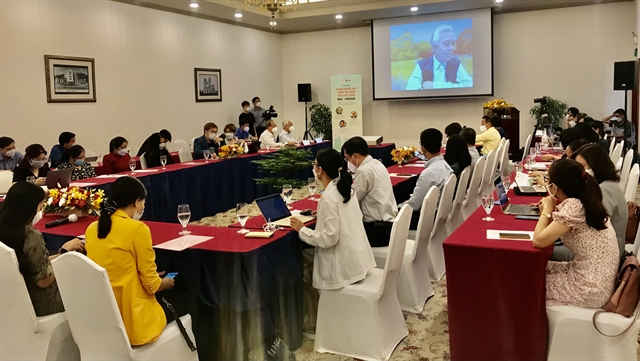Watch out for Russia-Ukraine conflict impacts, VN businesses told
VIETNAM, March 13 -

Vietnamese firms were advised to brace for impacts of the Russia-Ukraine conflict, several of which were detailed at a conference held in HCM City last Friday. VNS Photo Bồ Xuân Hiệp
Bồ Xuân Hiệp
HCM CITY — Vietnamese enterprises should prepare to deal with ramifications of the ongoing Russia-Ukraine conflict like rising oil prices and long-term impacts of sanctions on Russia, experts say.
Diversification of both export and import markets would be a key aspect of the preparation, they add.
Speaking at a conference on the impacts of the crisis on Vietnamese firms last Friday, Dr Trần Quốc Hùng, director of the US-based Institute of International Finance, said the crisis and the sanctions on Russia would disrupt the supply chain in the Western and world markets.
The likely disruptions to agricultural activities of two major exporters of staple commodities could seriously escalate food insecurity globally, he said.
Russia and Ukraine are the largest and fifth-largest wheat exporters, respectively. Together they account for almost 30 per cent of international annual sales, Hùng said.
Russia is also a world leader in fertiliser exports.
If the crisis continues, the supply of wheat to the world market could decrease by up to 30 per cent. The resulting supply gap could push up international food and feed prices by 8 to 22 per cent above their already elevated levels, it has been estimated.
According to the Food and Agriculture Organization, international food and feed prices could rise by up to 20 per cent as a result of the conflict.
Around 50 countries, including many of the least developed nations, depend on Russia and Ukraine for at least 30 per cent of their wheat supplies, leaving them especially vulnerable, it said.
Meanwhile, Việt Nam ranks second in rice exports at over 6.5 million tonnes per year; after India with 18.7 million tonnes per year.
“Việt Nam should take the opportunity to boost export of rice and other farm produce to the EU market, which imports $160 billion worth of food and farm produce annually,” Hùng said.
The EU market is also in need of an alternative supply source for agricultural products and food it gets from Russia and Ukraine, he noted.
Meanwhile, Việt Nam should import wheat from the US as an alternative to Russia, he added.
No major impact
Nguyễn Đức Thành, director of the Việt Nam Centre for Economic and Strategic Studies, said the crisis was unlikely to cause a significant direct impact on Vietnamese businesses.
As Russia isn’t among their key markets, Vietnamese firms will not be severely affected, he said. Those affected can still find ways to do transactions via a third-party bank, though this would be slower and more costly.
“As Russia and Ukraine account for less than two per cent of the global economy, the ongoing conflict is not likely to hurt the world’s economic recovery in a significant manner,” Thành said.
Việt Nam’s exports to Russia (mostly computers, components, phones, textiles, coffee and electrical products) was around $3.2 billion in 2021, while its imports reached $2.3 billion.
As for Ukraine, while its annual trade turnover with Việt Nam is less than $1 billion, it has been a long-standing traditional commercial partner. In 2021, trade turnover between the two countries reached $720.5 million, up 51 per cent year-on-year. Main exports to Ukraine are computers and footwear.
The rise in global oil prices, however, would hurt Việt Nam’s efforts to ramp up its economic activities, Thành said.
Former Ambassador to the US Phạm Quang Vinh, also former deputy minister of Foreign Affairs, said Vietnamese enterprises should be aware of the risks posed by the sanctions imposed on Russia by the US and EU, particularly in trade and payment.
The trade sanctions would be a challenge for Vietnamese exporters transacting directly with Russian importers already cut off from global payments networks, he said.
Other problems facing exporters include shipment delays and higher shipping costs.
Lê Duy Toàn, director of Duy Anh Food Import and Export Co., Ltd, said that his company exports five containers of goods to the Russian and Ukrainian markets a month.
When the conflict broke out, shipments to Russia were delayed or stuck. The company plans to diversify its export markets to Eastern European markets with the same quality standards, he said.
Vũ Kim Hạnh, chairwoman of the Association of High-Quality Vietnamese Goods Enterprises, said to diversify export markets, Vietnamese exporters must improve the quality of products especially to choosier markets. — VNS
Legal Disclaimer:
EIN Presswire provides this news content "as is" without warranty of any kind. We do not accept any responsibility or liability for the accuracy, content, images, videos, licenses, completeness, legality, or reliability of the information contained in this article. If you have any complaints or copyright issues related to this article, kindly contact the author above.
